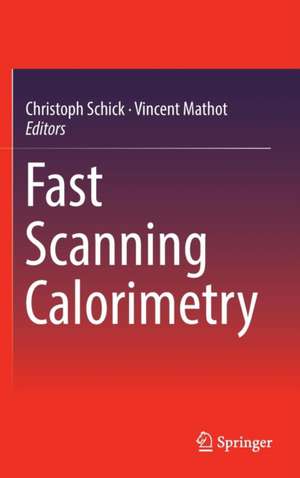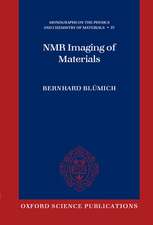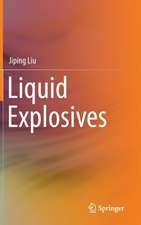Fast Scanning Calorimetry
Editat de Christoph Schick, Vincent Mathoten Limba Engleză Hardback – 6 iul 2016
| Toate formatele și edițiile | Preț | Express |
|---|---|---|
| Paperback (1) | 2112.54 lei 6-8 săpt. | |
| Springer International Publishing – 31 mai 2018 | 2112.54 lei 6-8 săpt. | |
| Hardback (1) | 2118.99 lei 6-8 săpt. | |
| Springer International Publishing – 6 iul 2016 | 2118.99 lei 6-8 săpt. |
Preț: 2118.99 lei
Preț vechi: 2584.14 lei
-18% Nou
Puncte Express: 3178
Preț estimativ în valută:
405.45€ • 423.37$ • 334.82£
405.45€ • 423.37$ • 334.82£
Carte tipărită la comandă
Livrare economică 15-29 aprilie
Preluare comenzi: 021 569.72.76
Specificații
ISBN-13: 9783319313276
ISBN-10: 3319313274
Pagini: 852
Ilustrații: XIV, 801 p. 479 illus., 340 illus. in color.
Dimensiuni: 155 x 235 x 43 mm
Greutate: 1.31 kg
Ediția:1st ed. 2016
Editura: Springer International Publishing
Colecția Springer
Locul publicării:Cham, Switzerland
ISBN-10: 3319313274
Pagini: 852
Ilustrații: XIV, 801 p. 479 illus., 340 illus. in color.
Dimensiuni: 155 x 235 x 43 mm
Greutate: 1.31 kg
Ediția:1st ed. 2016
Editura: Springer International Publishing
Colecția Springer
Locul publicării:Cham, Switzerland
Cuprins
Part 1. Advanced Instrumentation, Techniques and Methods.- Concepts and Practice of Material Characterization Using Fast Scanning Calorimetry.- Non-adiabatic Scanning Calorimeter For Controlled Fast Cooling and Heating.- Quasi-adiabatic, Membrane-based, Highly Sensitive Fast Scanning Nanocalorimetry.- Fast Scanning Calorimetry— Fast Thermal Desorption Technique: The Thin Wire Approach.- Fast Scanning Calorimetry of Silk Fibroin Protein: Sample Mass and Specific Heat Capacity Determination.- Scanning AC Nano-calorimetry and its Applications.- Isoconversional Kinetics by Fast Scanning Calorimetry.- Reliable Absolute Vapor Pressures of Extremely Low Volatile Compounds From Fast Scanning Calorimetry.- Part 2. Combination with Analytical Techniques and Molecular Simulations.- Design of an in-Situ Setup Combining Nanocalorimetry and Nano- or Micro-Focus X-Ray Scattering to Address Fast Structure Formation Processes.- Combining Fast Scanning Chip-Calorimetry With Structural and Morphological Characterization Techniques.- Integration of FSC with Microstructural Analysis Techniques.- Combining Fast-scan Chip-calorimetry with Molecular Simulations to Investigate Polymer Crystal Melting.- Part 3. Dynamics of (de)vitrification.- Cooling Rate Dependent Glass Transition in Thin Polymer Films and in Bulk.- The Glass Transition and Structural Recovery Using Flash DSC.- Part 4. Metastability and Reorganization in relation to Crystallization and Melting.- New Insights into Polymer Crystallization by Fast Scanning Chip Calorimetry.- Mesophase Formation in iPP Copolymers.- Industrial Applications of Fast Scanning DSC – New Opportunities for studying Polyolefin Crystallization.- Full-Temperature Range Crystallization Rates of Polyamides by FSC as Key to Processing.- Kinetic Studies of Melting, Crystallization, and Glass Formation.- Nucleation Kinetics Analyses of Deeply Undercooled Metallic Liquids by Fast Scanning Calorimetry.- Fast Scanning Calorimetry of Phase Transitions in Metals.- Precipitation- and Dissolution-Kinetics in Metallic Alloys with Focus on Aluminium Alloys by Calorimetry in a Wide Scanning Rate Range.- Martensitic Transformation of NiMnGa Shape Memory Alloys Thin Films Studied by Flash DSC.
Recenzii
“The editors expertly identify contributors and maintain a high level of consistency and subject matter for each chapter. … Most impressive is the wide variety of new experiments and applications that can be conducted with the instruments discussed within the work. This very professional, reader-friendly text demonstrates and explains the rapid development of a set of new thermal methods with exciting capabilities. Summing Up: Recommended. Upper-division undergraduates through researchers and faculty; professionals.” (J. Allison, Choice, Vol. 54 (4), December, 2016)
Notă biografică
Christoph Schick is Professor at the Institute of Physics of the University of Rostock and is Head of the Polymer Physics Group. His research focuses on advanced calorimetry, like temperature modulated or fast scanning, applied to polymers, metals, and other substances. He is interested in crystallization, nucleation, and glass transition in these materials. He authored or coauthored about 300 publications and received the Mettler Toledo Award of NATAS, The James J. Christensen Memorial Award of the Calorimetry Conference and the Wissenschaftspreis of GEFTA.
Vincent Mathot performed research at DSM Research, SciTe BV (both in the Netherlands) and as guest professor at the Katholieke Universiteit Leuven (Belgium) on molecular structure; crystallization and melting; morphology; thermal properties; relationships between these topics with regard to polymeric systems; as well as development of methods and advanced instrumentation. Throughout his aim was to link quantitative, fundamental research to applications, and to make the results found available to the scientific community by publications and lectures. He edited a book and a special issue on thermal properties of polymers, and is recipient of the Mettler-Toledo Award of NATAS and the TA Instruments ICTAC Award for his thermal analysis activities.
Vincent Mathot performed research at DSM Research, SciTe BV (both in the Netherlands) and as guest professor at the Katholieke Universiteit Leuven (Belgium) on molecular structure; crystallization and melting; morphology; thermal properties; relationships between these topics with regard to polymeric systems; as well as development of methods and advanced instrumentation. Throughout his aim was to link quantitative, fundamental research to applications, and to make the results found available to the scientific community by publications and lectures. He edited a book and a special issue on thermal properties of polymers, and is recipient of the Mettler-Toledo Award of NATAS and the TA Instruments ICTAC Award for his thermal analysis activities.
Textul de pe ultima copertă
In the past decades, the scan rate range of calorimeters has been extended tremendously at the high end, from approximately 10 up to 10 000 000 °C/s and more. The combination of various calorimeters and the newly-developed Fast Scanning Calorimeters (FSC) now span 11 orders of magnitude, by which many processes can be mimicked according to the time scale(s) of chemical and physical transitions occurring during cooling, heating and isothermal stays in case heat is exchanged. This not only opens new areas of research on polymers, metals, pharmaceuticals and all kinds of substances with respect to glass transition, crystallization and melting phenomena, it also enables in-depth study of metastability and reorganization of samples on an 1 to 1000 ng scale. In addition, FSC will become a crucial tool for understanding and optimization of processing methods at high speeds like injection molding. The book resembles the state-of-the art in Thermal Analysis & Calorimetry and is an excellent starting point for both experts and newcomers in the field.
Caracteristici
Introduces and describes the capabilities of Fast Scanning Calorimetry (FSC) measurement instrumentation Details the options for mirroring of real-life processes including processing of polymers via extrusion and injection molding Provides advanced characterization methods and techniques Describes a range of applications for polymers and metals









